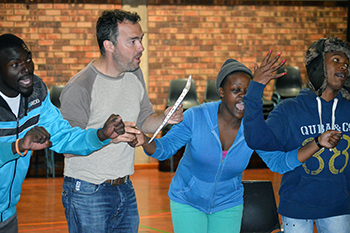Latest News Archive
Please select Category, Year, and then Month to display items
12 October 2020
|
Story Arina Engelbrecht
|
Photo Supplied
 Arina Engelbrecht from Organisational Development and Employee Well-being believes physical activity has a number of benefits for one’s health, including stress relief.
Arina Engelbrecht from Organisational Development and Employee Well-being believes physical activity has a number of benefits for one’s health, including stress relief.
Being physically active plays a big role in preventing the development of mental-health problems and in improving the quality of life of people experiencing mental-health problems.
Treatment for depression
Physical activity can be an alternative treatment for depression. It can be used as a stand-alone treatment or in combination with medication and/or psychological therapy. It promotes all kinds of changes in the brain, including neural growth, reduced inflammation, and new activity patterns are formed that promote feelings of calm and well-being. It releases endorphins – powerful chemicals in the brain that energise your spirit and make you feel good.
Physical activity can be very effective in relieving stress. Research in adults has found that physically active individuals tend to have lower stress levels compared to individuals who are less active. It also leads to improved sleep. When a person sleeps better and feels more rested, overall quality of life improves. They cope better with daily life stressors.
Reduce Alzheimer's risk
Regular physical activity can reduce your risk of developing Alzheimer's disease by up to 50%. It can also slow down further deterioration in those who have already started to develop cognitive problems. It stimulates the brain’s ability to maintain old connections as well as to make new ones.
A study asked people to rate their mood immediately after periods of physical activity (e.g. going for a walk/run, cycling, doing housework) and periods of inactivity (e.g. reading a book or watching television). Researchers found that participants felt more content, more awake, and calmer after being physically active compared to after periods of inactivity.
In conclusion, people who are physically active feel a sense of well-being, feel more energetic throughout the day, sleep better at night, have sharper memories, and feel more relaxed and positive about themselves and their lives.
“Being physically active not only changes your body, it changes your mind,
attitude, and your mood.” – Arina Engelbrecht
I-DENT-I-TIES to shine at the Free State Arts Festival
2016-07-08

Erwin Maas with members of the student cast from the
Qwaqwa Campus. They are, from left: Mpho Xaba,
Lebohang Molefe and Tankiso Mofokeng.
Imagine this: A student cast from a rural campus; Production team consisting of a New York-based Dutch director, a South African screen and stage legend, a The Hague/Vienna-based Dutch theatre designer, and a Vienna-based Serbian performance-craft-artist and designer.
This sounds like a far-fetched flight of the imagination. But it is real and it is called ‘I-DENT-I-TIES’, a large-scale interdisciplinary performance project with international theatre professionals and students from the University of the Free State’s (UFS) Qwaqwa Campus.
According to the director of the project, Erwin Maas, the production explores the ‘dents’ and ‘ties’ of both individual and communal identification and distinctiveness and does this through the famous Basotho story of ‘Moshanyana Sankatana’ as a point of departure.
“We explore questions like ‘what are dents in our society as well as in ourselves’, ‘what ties me to who I really am and who I want to be’, ‘what does it mean to be me’, ‘what does it mean to be South African’,” said Maas, who has been working on this project since last year.
The production also celebrates personal, communal, and universal narratives and identities through song, dance, story-telling, and music. It explores the past, the present, and the future.
“This production will certainly reveal an extraordinary journey into what makes us unique and binds us together,” he added during the rehearsals that started in May at the Qwaqwa Campus.
Maas has teamed up with a well-known South African film and stage legend, Jerry Mofokeng, as consultant. Mofokeng, who introduced Maas to the ‘Sankatana’ story, has featured on a number of critically-acclaimed films that include ‘Cry, The Beloved Country’ as well as the Academy Award-winning ‘Tsotsi’. Maas has also worked with the Hague/Vienna-based Dutch designer Nico de Rooij and Djana Covic, a Vienna-based Serbian designer.
The production is a partnership between the UFS Student Affairs, Vrystaat Arts Festival, the Programme for Innovation in Artform Development, and the Kingdom of the Netherlands in South Africa. It will premiere at the Free State Arts Festival, held in Bloemfontein from 11 to 16 July 2016. This will be followed by a performance at the Qwaqwa Campus on 19 July 2016.